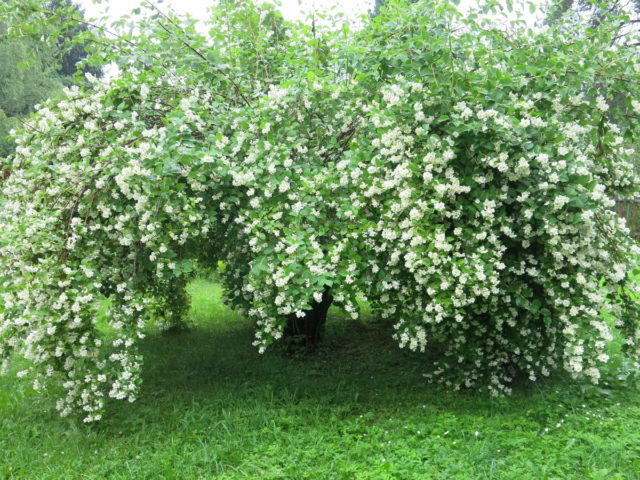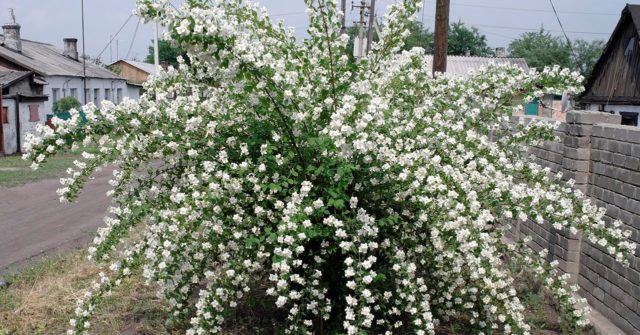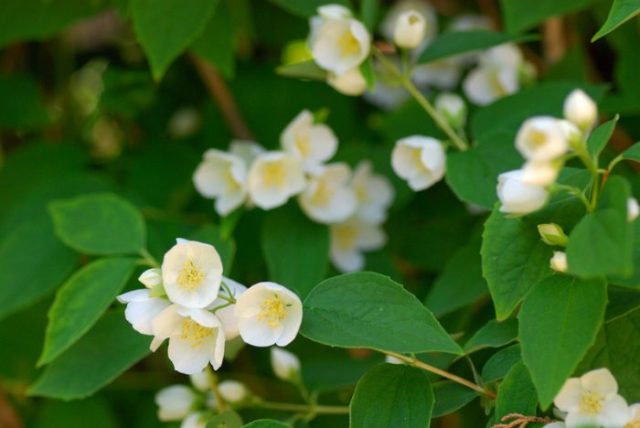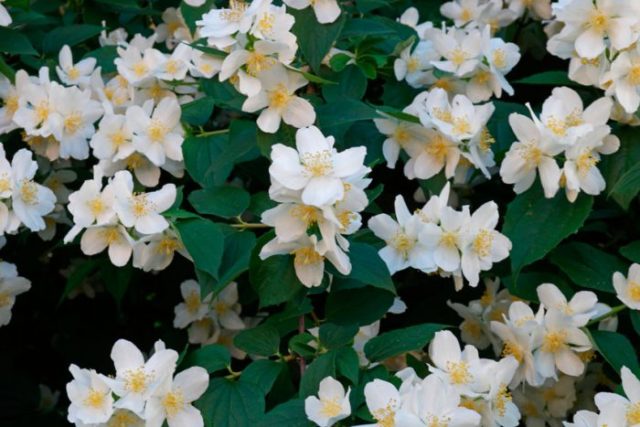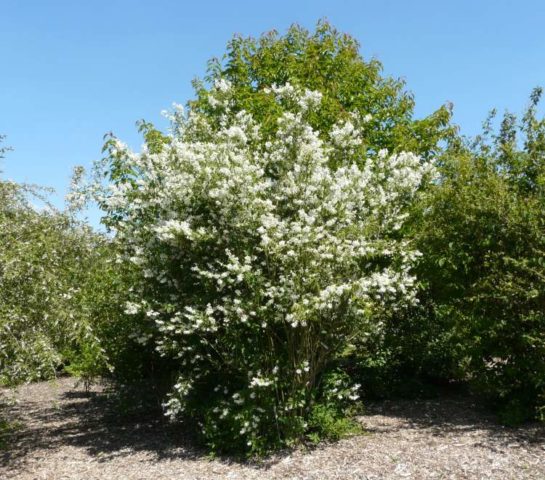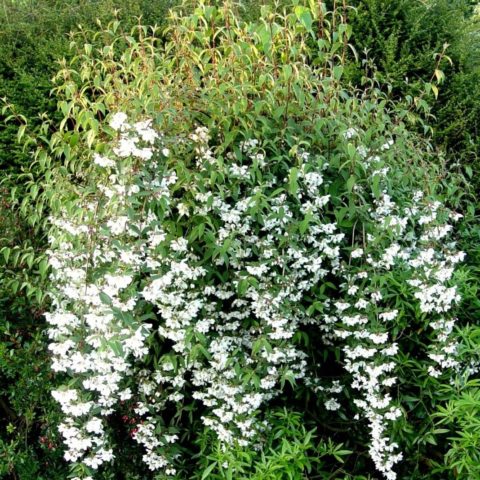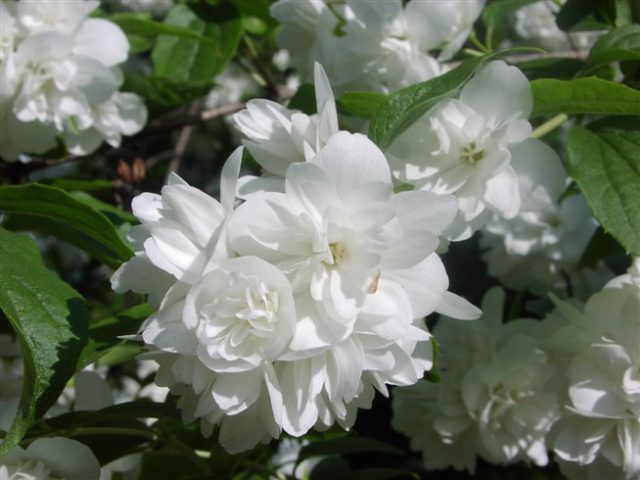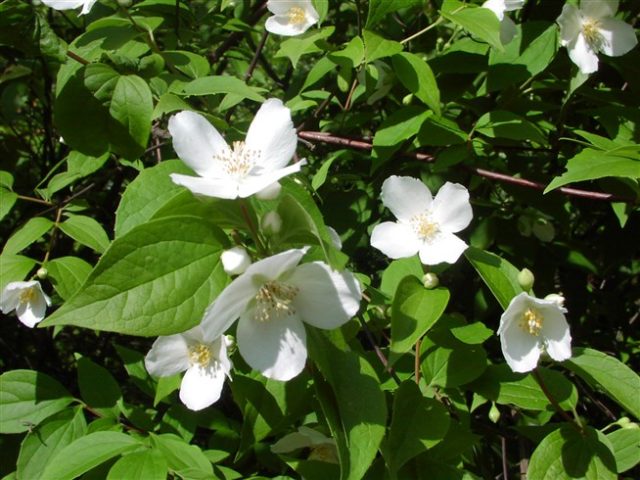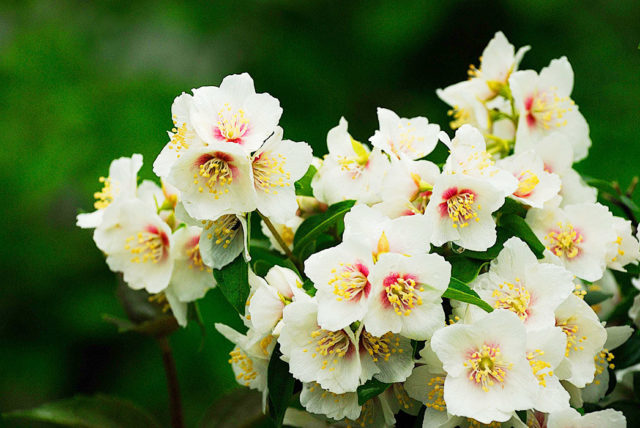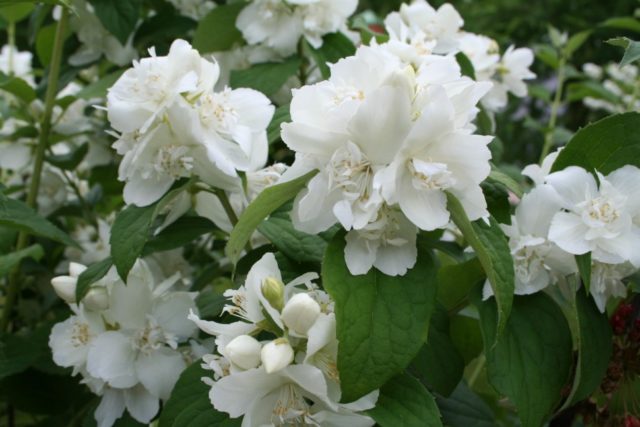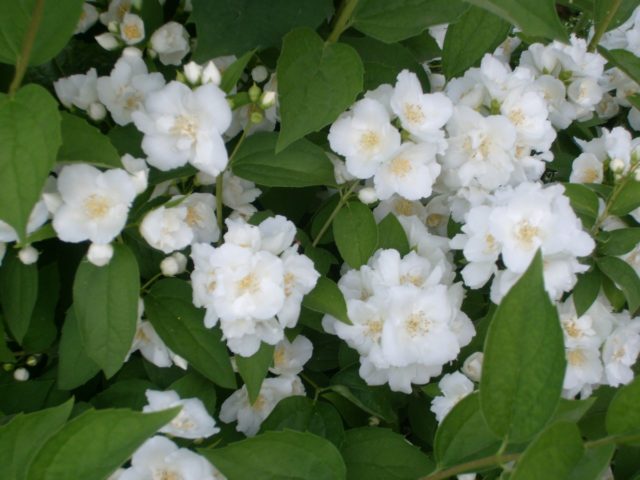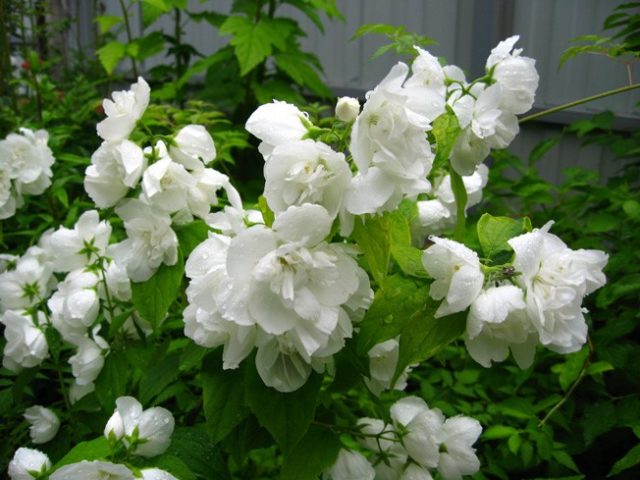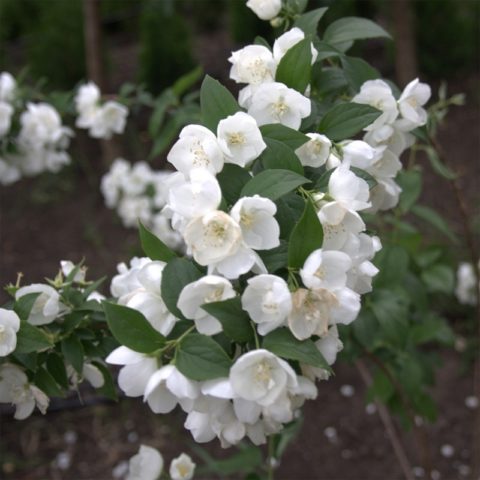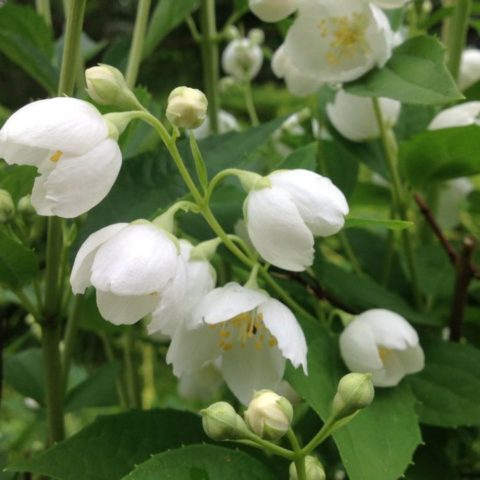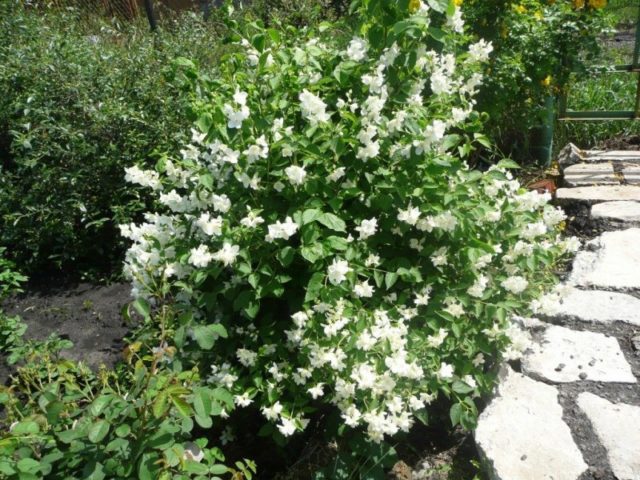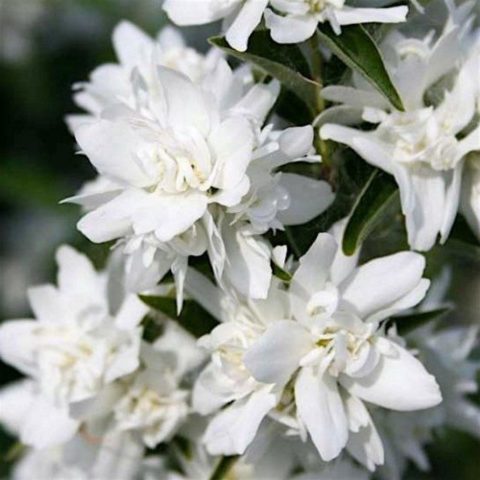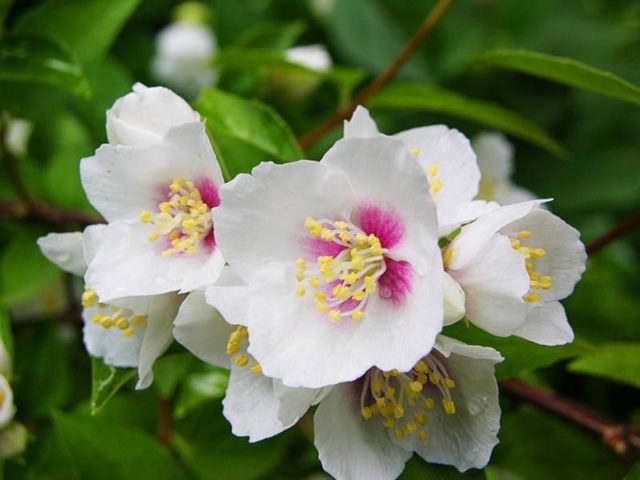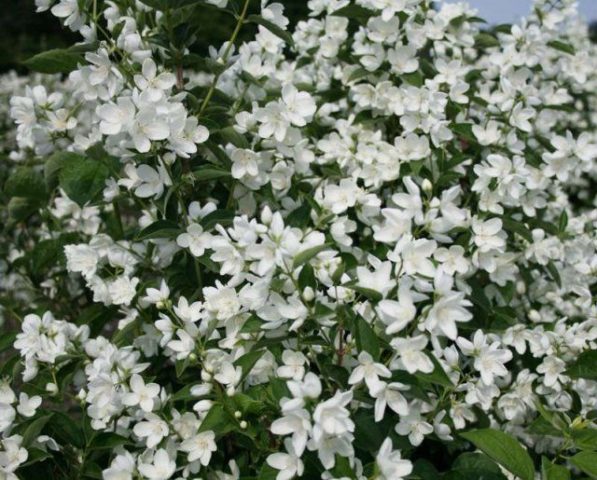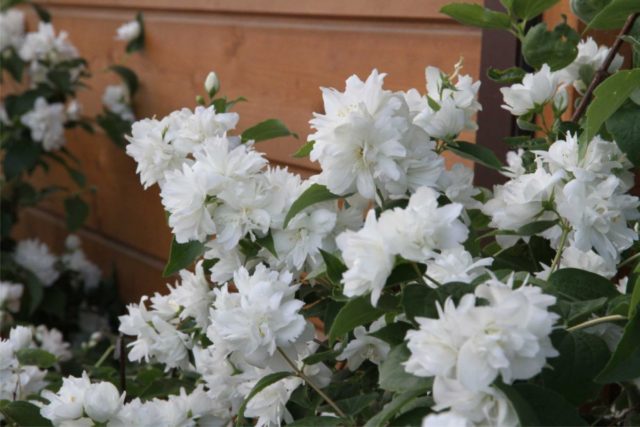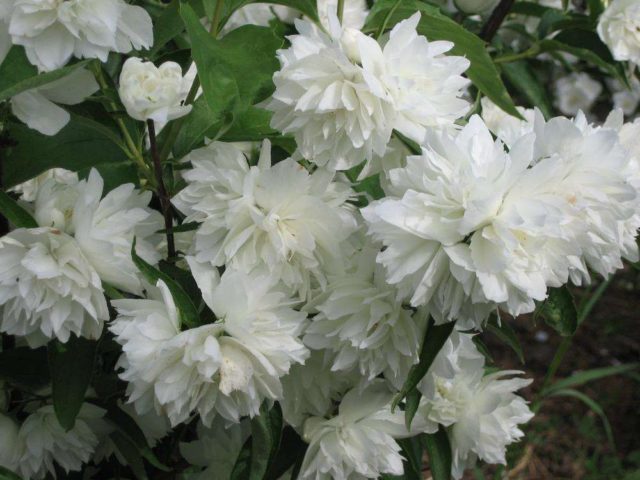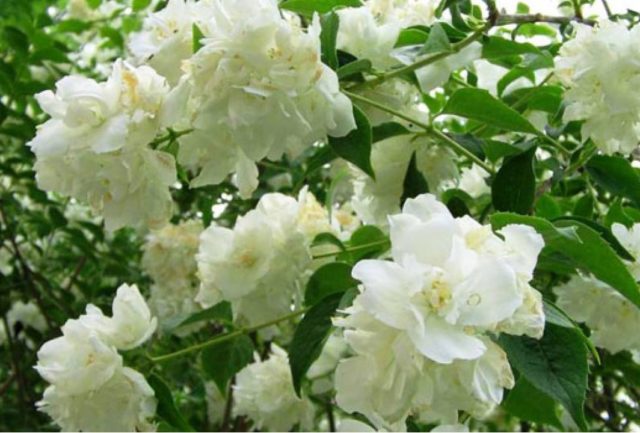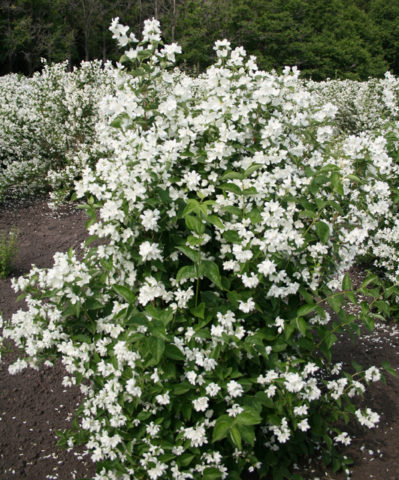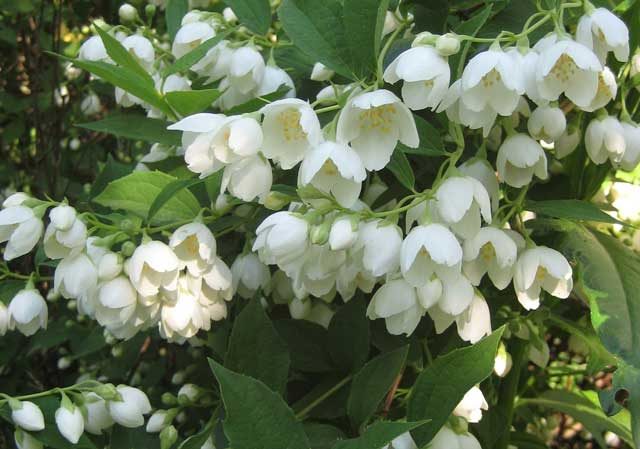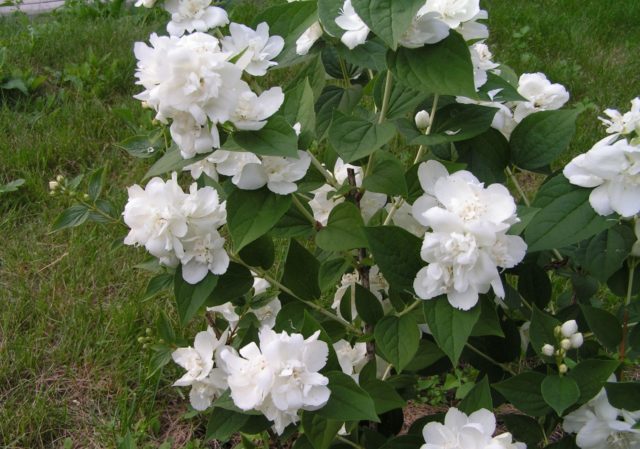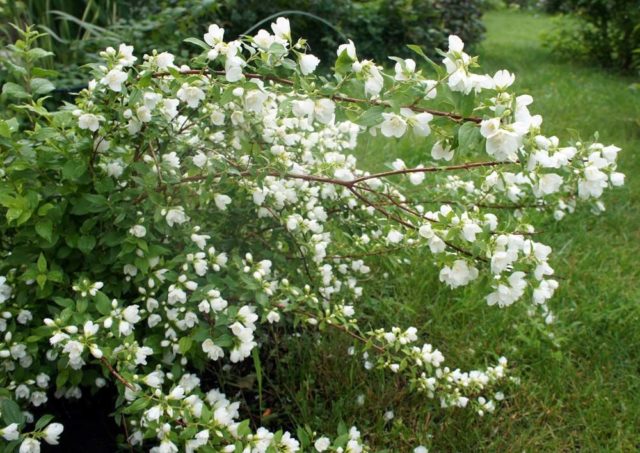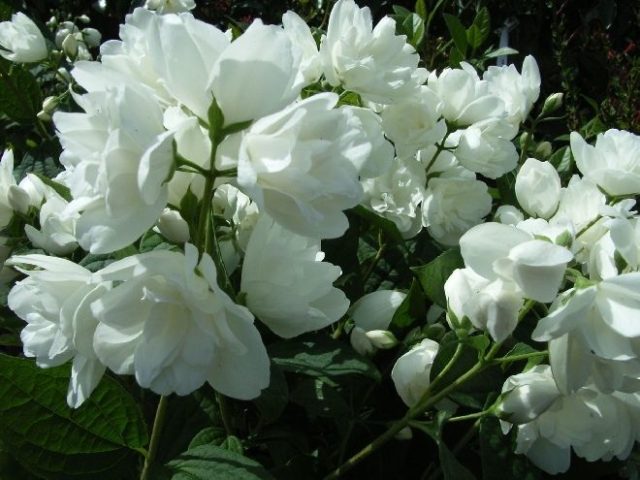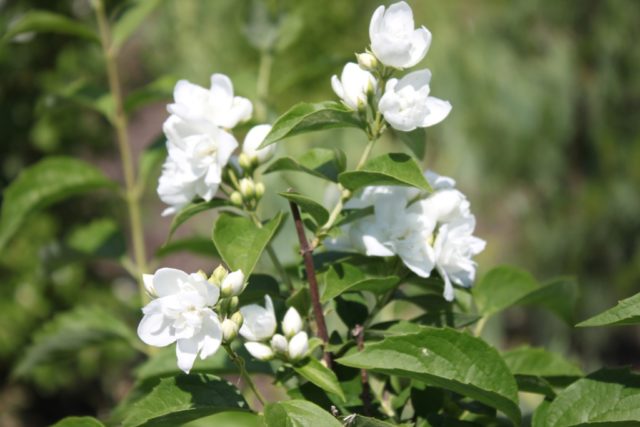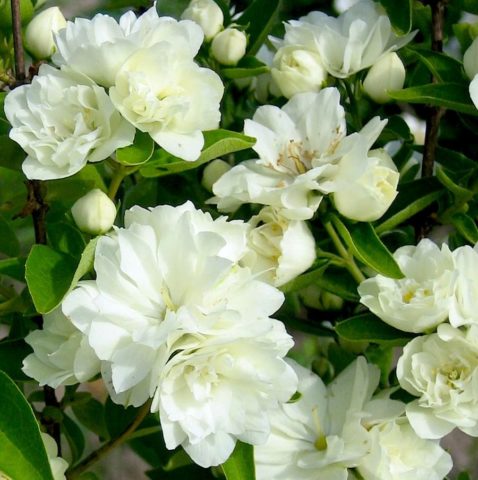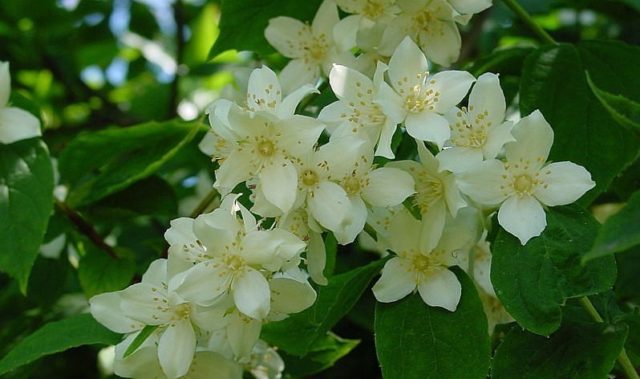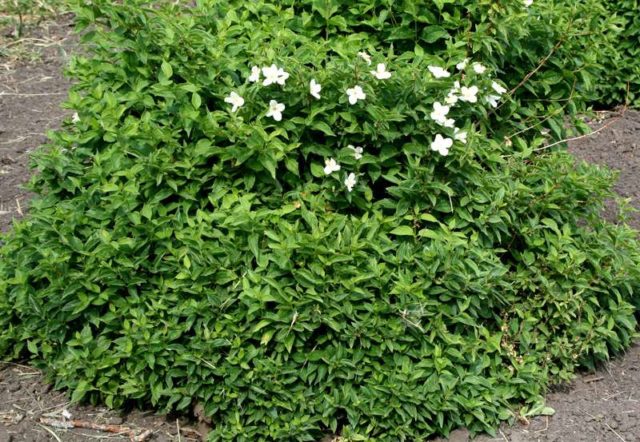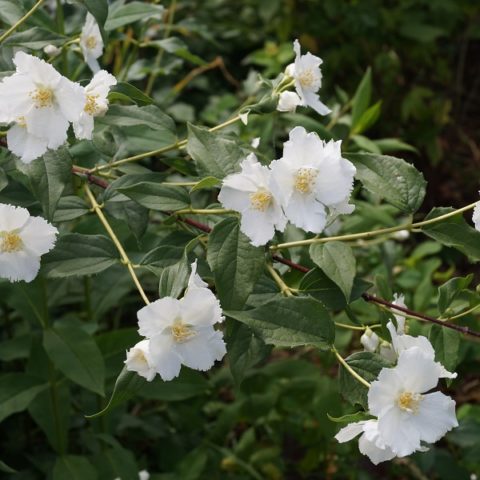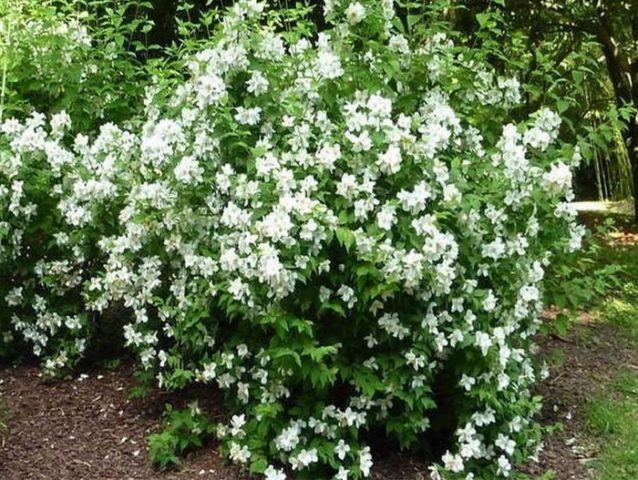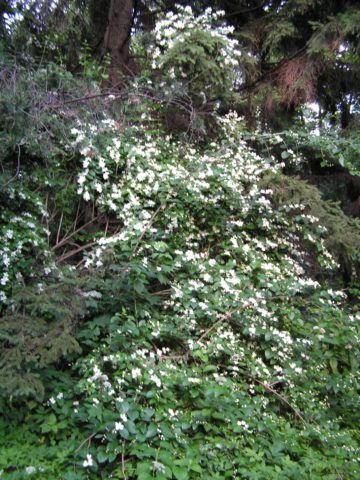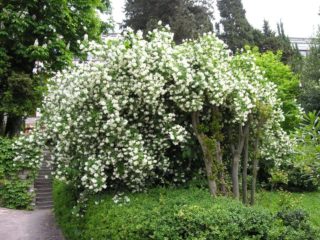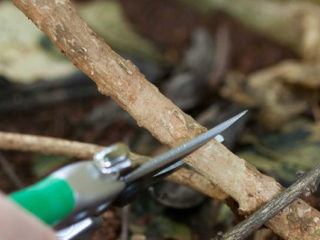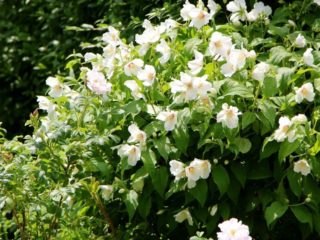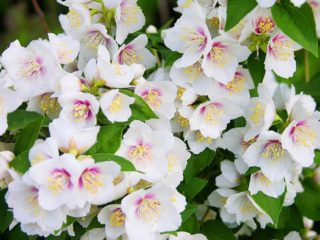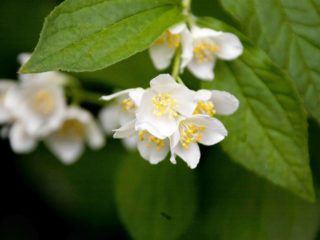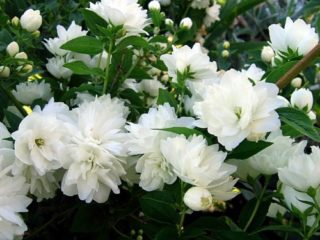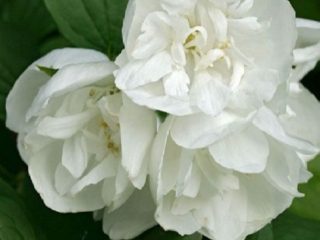Content
Hybrid varieties of chubushnik are gaining more and more popularity among gardeners. Any site will receive a unique flavor thanks to the use of shrubs with different types and periods of flowering. The plant is unpretentious, therefore it is suitable even for beginners. The main thing is not to make a mistake when buying a seedling. The mock-mushroom varieties with photos and descriptions must be studied carefully, choosing a shrub, depending on climatic conditions.
What is chubushnik and how does it grow
The Latin name for chubushnik Philadelphus comes from the Greek words "love" and "brother", because the shoots of the bush are located opposite and close to each other. According to another version, the name of the deciduous shrub was given in honor of one of the kings of Ancient Egypt, Ptolemy Philadelphus.
Chubushnik belongs to the Hortensiev family. Botanists know more than 60 species of this plant that grow in the wild. Not more than half of all varieties of garden jasmine are cultivated.
What does a chubushnik look like?
All types of chubushnik are similar in basic parameters. These are shrubs from a meter to three meters in height with closely spaced opposite shoots. Its leaves are roundly elongated, sometimes pointed, small (5 - 7 cm), more often - even, but they also occur with jagged edges.
The bark of the plant is predominantly gray. In some types of jasmine, it is brownish. In most varieties, the bark darkens on the shoots of the second year of life. In some it is completely, in others only at the base. The bark exfoliates on adult shoots.
Garden jasmine blooms in late spring and lasts from a month to two. Its flowers are simple, white, from 2 cm in diameter, collected in inflorescences from 3 to 9 pieces, bloom on short lateral branches of the shoot. Most types of chubushnik, or garden jasmine, as it is often called, have a delicate aroma. But there are also odorless species. In varietal hybrid varieties, the inflorescences can consist of double flowers and reach a size of more than 10 cm.
Blooming mock orange (jasmine) photo:
The fruit of the chubushnik is not large. The capsules, consisting of several chambers, are filled with small achenes.
In nature, chubushnik grows in regions with a warm and temperate climate (north of the American continent, East Asia, Europe). Prefers the culture of the edge of deciduous or mixed forests. It is often found on talus and cliffs. Bushes grow one by one and in groups.
How quickly the mock-orange grows
Garden jasmine is classified by gardeners as fast-growing shrubs. It takes only 2 - 3 years from the moment of planting for the height and size of the crown of the chubushnik to reach the maximum for their variety.
The use of chubushnik
In landscape design, jasmine is versatile. Single bushes perfectly decorate garden gazebos, look original against the background of brick and stone walls of the house and other buildings. Due to the rapid growth of shoots, the chubushnik is suitable for creating hedges of various heights.
Photo of a single planting of a mock-orange bush:
Types of chubushnik with photos and descriptions
Garden jasmine varieties must be carefully matched to the growing conditions. Some of them are not suitable for the frosty Russian winters. And although most species grow quickly after sanitary spring pruning of frostbitten shoots, the main characteristics of the mock-orange should be studied before buying a seedling.
Ordinary
In nature, this type of garden jasmine grows in the southern regions of Western Europe and the Caucasus. The three-meter shrub blooms earlier than other representatives of the glorious family. Pallid frock, or ordinary (Philadelphus pallidus), is distinguished by naked erect shoots. The leaves of the shrub are pointed, with sparse small notches along the edge. Their upper side is dark green, and the lower side is much lighter and covered with fluff. Milky-white simple small, up to 3 cm, flowers are collected in clusters of up to 7 pieces each.
Common chubushnik became the progenitor of several forms and varieties of shrubs: large-flowered, golden, willow, double, silvery-bordered, low.
Very popular among gardeners are hybrid varieties of pale mock-mushroom Virginal, Belle Etoile and Bicolor.
Coronary
The southern European newcomer has taken its rightful place in gardens around the world. Breeding this variety of garden jasmine began in the 16th century.
A bush up to 3 m in height forms a lush crown - up to 2 m in diameter. Even young shoots are covered with peeling red-brown and yellowish bark.
Leaves of deep green color are oblong and pointed. Their reverse side is pubescent with veins. Fragrant inflorescences, consisting of 3 to 5 simple creamy white flowers, cover the shrub for 3 to 4 weeks, starting from the 5th year of life.
Philadelphus coronarius (Latin for the name) is one of the longest-lived members of its family. According to the description and photo, the crown mock-orange in nature can reach the age of 80 years. At the same time, it blooms for at least 30 seasons.
Breeders have done a lot of work on the oldest type of jasmine. Many varieties have been created that differ in flower structure and other characteristics. Among the most famous hybrids, gardeners note Innosens, Variegatus and Aureus.
Fluffy
This type of garden jasmine got its name because of the airiness of the lower leaves. A layered brownish bark covers the shoots only from below. Lush cups of snow-white flowers, collected in inflorescences (7-10 pieces each), are almost odorless. The shrub blooms by the middle of summer. This is one of the most late-flowering mock-mushrooms.
This type of chubushnik became the basis for the creation of many varieties by Russian breeders: Ballet of Moths, Zoya Kosmodemyanskaya, Unusual Pearls, Academician Korolev.
And although hybrids were bred several decades ago, they are still popular with gardeners.
Small-leaved
Not only small leaves of about 2 cm are a distinctive feature of garden jasmine. The photo of the chubushnik does not convey its main feature - the unique strawberry aroma. This type of gardeners is often called Strawberry.
A small (1.5 m) bush has an equally compact crown. Simple flowers are arranged singly or in small inflorescences. The flowering shrub is usually active. It is covered with a snow-white blanket so that its erect shoots bend over, forming a cascade.
On the basis of small-leaved jasmine, the amazingly beautiful hybrids of Snow Avalanche, Ermine Mantle and Avalange have been created.
Hybrid
This category includes many interspecific combinations that have been created by breeders around the world. Among the most popular varieties, gardeners note the French hybrids of the Lemoine selection and the Russian academician Vekhov, many of which received their own names.
Shrub flower chubushnik hybrid Minnesota Snowflake in the photo:
New varietal characteristics were obtained by crossing various natural species of chubushniks. The main achievements were the production of two-color varieties of garden jasmine, an increase in the flowering period and frost resistance of the culture.
Odorless
One of the tallest shrubs in the garden jasmine genus. It reaches a height of 4 m, and its crown diameter is about 3 m. The plant is distinguished by its long and lush flowering. But its main feature is the lack of aroma. Four- and five-petalled simple flowers are collected in clusters of up to 5 pieces. Their leaf plates are very long for chubushniki. On non-flowering shoots, they are up to 12 cm.
Lemoine
As a result of selection by the French originator Lemoine, the first hybrid with increased frost resistance and unique decorative qualities was bred. Currently, there are about 40 hybrid varieties of garden jasmine Lemoine workshop. Most of them are undersized, reaching a height of no more than 1.5 m. At the same time, the crown of shrubs quickly grows to the same size.
The flowers of the French hybrids of the mock-orange are striking in their variety. Among them there are terry varieties and two-color ones. Shrubs and foliage differ. Oval, ovoid and pointed leaves can be from light green to pale golden in color. The most popular varieties: Dame Blanche,, Snow Avalanche, Avalanche Mont Blanc, Belle Etoile, Pyramidal.
Lemoine was the first of the breeders who managed to create a mock orange with white and purple flowers. Natural specimens have only white or creamy inflorescences.
Schrenck
This tall chubushnik was named after the famous Russian scientist and traveler Alexander von Schrenk. In nature, the shrub is found in the Far East and neighboring countries.
The shrub grows up to 3 m in height. The bark on its young shoots is brownish and covered with hairs. But from the second year of life, it begins to crack and crumble. In this case, the color changes to grayish brown.
Schrenck's mock-orange leaves are ovoid and slightly narrowed at the upper edge. Shrub bloom in early June in central Russia. Small (up to 4 cm) flowers with a delicate aroma are collected in bunches of 9 pieces.
The best varieties of chubushnik
Among the many species and varieties of garden jasmine, you can choose a shrub for your garden that is ideal for its decorative qualities and growing conditions.
Fragrant varieties of chubushnik
Most natural types of mock-orange have a scent. But breeders have enhanced this quality. If you need a garden jasmine with a scent for your garden, then you should pay attention to the Lemoine and Vekhov varieties.
- Snow avalanche - a miniature French hybrid (up to 1.2 m), which blooms from the end of June. Its tiny flowers give off a strong strawberry scent. The fragrance lasts for about 2 weeks.
- Bouquet Blanc - called the White Bouquet... Terry inflorescences with a sweet aroma cover the almost two-meter shrub for 3 weeks.
- Gletscher - blooms with terry snow-white flowers for almost a month. Large inflorescences emit an aroma similar to that of jasmine.
- Alabaster - combines double and simple flowers during flowering. Their aroma is strong and pleasant.
- Airborne assault - surprises with drooping flowers, similar to the canopy of parachutes in the sky. The aroma of this unique variety is strawberry, with a hint of exotic fruits.
- Miniature varieties of Vekhovo selection Gnome and Dwarf - speak for themselves. From 50 to 80 cm tall, compact bushes spread a unique aroma during flowering.
The most beautiful varieties of chubushnik
It's hard to argue about tastes, especially when it comes to beautiful plants like mockwings. Each hybrid is beautiful in its own way. Some are covered with double flowers, while others are attractive in the shape of the petals or the structure of the flower. And the height of splendor are varieties with a two-tone color. After all, absolutely all types of chubushnik naturally bloom white or slightly creamy.
- Few will be left indifferent by the Salute variety... A shrub more than 2 m tall during flowering is strewn with inflorescences consisting of fairly large double flowers of a creamy white color.
- Shoots of Komsomolets - slightly curved upwards. Large (up to 4.5 cm) inflorescences cover the shrub with a snow-white blanket. Flowers have an interesting structure. The lower petals are round and shorter than the upper ones.And the thin inner petals envelop the pale yellow stamens.
- Belle Etoile, or the Beautiful Star, - a hybrid of the Frenchman Lemoine, who bears his name for a reason. The bush has snow-white simple flowers with a lilac center and yellow stamens. Flowering lasts about a month.
- Ballet of moths - is beautiful with its simple asymmetrical colors. During flowering, this lush, powerful shrub has almost no foliage.
- Bicolor - differs in large, about 5 cm flowers. Its distinctive feature is the middle of the burgundy-pink color, against which the yellow delicate stamens stand out brightly.
- Shneeshturm - is considered the most furry hybrid. Its flowers - very large and terry - cover a three-meter bush for a month.
You can enumerate for a long time the unusually beautiful varieties of chubushnik, and every gardener will have his own favorite representative.
Frost-resistant varieties of chubushnik
The shrub grows naturally in a temperate climate. Most species easily endure winters with temperatures down to -20 ° C. But for the cold climate of Russia, more frost-resistant varieties of jasmine are needed. Academician N. Vekhov was engaged in this very quality. He managed to develop hybrids that can tolerate frosts of -25 - 30 ° C in the open field.
- snow avalanche - was created on the basis of another hybrid. Academician Vekhov improved the winter hardiness of the French garden jasmine variety Avalanche.
- Moonlight - tolerates frosts of -25 ° C quite easily. Amazing shrub with greenish double flowers.
- Flight of moths - does not require shelter in frosts of about -30 ° C. At lower temperatures, the tops of the shoots freeze.
- Airborne assault - suitable for Siberia and central Russia.
- Garden jasmine variety Zoya Kosmodemyanskaya with its terry large flowers and unobtrusive aroma, it is suitable for Siberia and the Far East. In the northern regions, the culture grows well with shelter for the winter.
Advice! Even varieties with high frost resistance can freeze under especially severe winters. To save the bush, it is enough to cut off the frozen shoots. The shrub quickly restores shoots, and this has almost no effect on flowering.
Low-growing varieties of chubushnik
In nature, chubushnik is represented by species reaching 3 m in height. Thanks to scientists, varieties have appeared in our gardens that do not exceed a meter in height. There are also very dwarf hybrids among them.
- Ermine mantle - 1m;
- Dame blanche -1m;
- Enchantement - 1m;
- Moonlight -70 cm;
- Duplex - 60 cm;
- Gnome - 50 cm;
- Dwarf - 30 cm.
Interestingly, the diameter of the crown of these miniature bushes of garden jasmine can be several times higher than their height.
Tall varieties of chubushnik
In addition to the already mentioned Snowstorm and Minnesota Snowflake, experts call the following varieties of garden jasmine, reaching 3 or more meters in height, tall:
- Pyramidal;
- Kazbek;
- Chubushnik Gordonwhich reaches 5 m in height.
Tall shrubs are suitable for the back line of garden compositions.
How to choose the right garden jasmine variety
It is difficult to decide on the choice of a variety of garden jasmine. Each of them is remarkable for something. In order not to be mistaken, you should buy seedlings in specialized institutions. In the nursery you can find out about the types of mock-mushrooms with photos and descriptions. It is important to pay attention:
- Frost resistance of garden jasmine must correspond to the region of residence. In a warm southern climate, any variety will thrive. And in colder areas, species are needed that can withstand frosts up to 25 - 30 ° C.
- Before buying a false jasmine seedling, you need to decide on a planting site. If a hedge is planned, then you should take a closer look at varieties no more than one and a half meters in height.
- Seedlings with an open root system can be purchased for spring planting. In the fall, it is better to opt for seedlings in containers.
It is better for beginners to try their hand at low-growing varieties of mock-orange. Unpretentious plants require less attention when growing.
Conclusion
The mock-mushroom varieties with photos and descriptions are numerous on various sites that provide landscape design services. When choosing a garden jasmine for planting, you should consider the possibilities of planting and caring for this flowering shrub.
